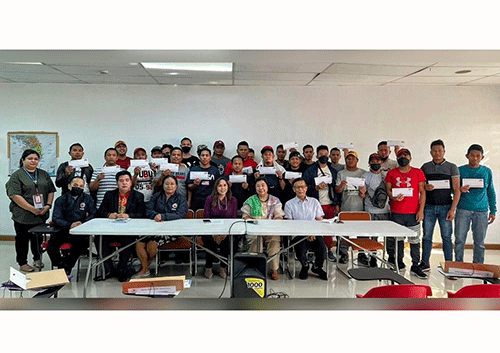Kinney Ndopu
KATIMA MULILO – Namibia has celebrated the great strides made in combating trafficking in persons.
During the commemoration of World Day Against Trafficking in Persons (WDATIP) in the Zambezi region, Deputy Prime Minister and Minister of International Relations and Cooperation Netumbo Nandi-Ndaitwah praised those involved in maintaining Namibia’s status as a Tier 1 country in the 2021 Trafficking in Persons (TIP) report for prohibiting severe forms of trafficking in persons and punishing acts of trafficking.
Namibia is again the only country in Africa to achieve a tier one ranking, joining 28 countries globally.
“Indeed, it is important to recognise the progress made so far. However, there is still significant room for improvement specifically to leverage on use and misuse of technology. Currently, the Namibian Police have 57 cases under investigation, of which 17 cases are on the court roll.
“I am delighted to mention that Namibia maintained tier one because as a country, we met the required minimum standard to address trafficking in persons. These range from having laws in place, awareness creation campaigns, capacity building of key services providers and proving victim assistance,” said Nandi-Ndaitwah, in a speech read on her behalf by the Minister of Gender Equality, Poverty Eradication and Social Welfare Doreen Sioka.
The day is marked internationally on 30 July annually. Namibia commemorated the day last Friday under the theme: ‘Use and Abuse of Technology’.
Nandi-Ndaitwah further said to combat trafficking in persons, government has over the years referred identified victims to care, port employees are always trained on trafficking victim identification, and eight government-operated shelters to provide care to victims of trafficking were opened.
She added that for the previous financial year 2021/2022, Namibia assisted 39 victims of trafficking through the ministry of gender equality.
She also pointed out that there are about 1 155 trained front-line responders. These include investigating officers, immigration officers, and labour inspectors.
“I would want to see these trained personnel visibility in communities, specifically in rural areas to continue educating our citizens on what constitutes trafficking in persons; different forms; signs and preventative ways,” said Nandi-Ndaitwah.
– Kinney Ndopu is an intern in the MICT in the Zambezi region.


